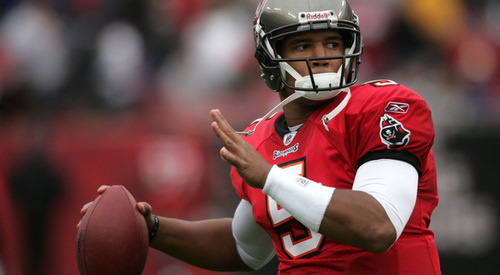
Young Bucs lead new era of football in Tampa Bay
Last year, the Tampa Bay Buccaneers took a lot of people by surprise. They were the youngest team in the league, and while some improvement was expected, no one expected the 3-13 team improve all the way to 10-6 – the same regular season record as the Super Bowl champion Green Bay Packers. They fell just short of the last NFC playoff spot, but there were plenty of reasons for optimism in Tampa. Besides their great breakthrough in wins and losses, the team also realized it had a franchise quarterback in Josh Freeman.
Sander Philipse, the manager of SB Nation’s Bucs Nation, said not even the most optimistic Buccaneers’ fans predicted what happened in 2010.
“I think everyone had to be surprised at last year’s result,” Philipse said. “While there was generally an expectation that the Bucs would improve, going from 3-13 to 10-6 and having Josh Freeman emerge as a clear franchise quarterback was more than anyone had a right to expect.”
Last year, Freeman threw for over 3,400 yards with 25 touchdowns and only six interceptions. However, this season, the 23-year-old has only two touchdowns and four interceptions through three games. Interception rates do tend to regress, though, so this isn’t all that unexpected, and perhaps may be part of his growing process. Meanwhile, it’s not like the team’s really suffered so far; they’re 2-1 on the year and tied for first in the NFC South.
Freeman isn’t the only young gun on this Buccaneers team. In fact, the Buccaneers have the youngest offense and defense in the NFL. Even their specialists are the youngest in the league, for the second year in a row.
[php snippet=1]
The Bucs’ young players have plenty of interesting stories, too. Among their youth element are receiver Mike Williams and running back LeGarrette Blount, who had controversy in their college careers. Williams was suspended from the Syracuse team for academic issues in 2008 and quit the team in November 2009 after getting involved in a car accident with teammates, while Blount infamously punched Boise State’s Byron Hout in Oregon’s 2009 season-opener and missed most of the season thanks to suspension.
There’s also rookie defensive lineman Da’Quan Bowers from Clemson, who led all NCAA players with 15.5 sacks and tied for the national lead with 26 tackles for loss, but had to undergo offseason knee surgery and dropped to the Bucs in the second round of the NFL Draft.
The head coach of Tampa Bay is Raheem Morris, the leader of this youth movement. Morris is 35 years old and in his third year of coaching the Bucs. He and general manager Mark Dominik have built a team that is growing together. In fact, the Buccaneers are younger this year than they were a year ago.
Philipse said Morris and Dominik have the full confidence of the fanbase going forward.
“Last year gave people a lot of confidence,” he said. “Josh Freeman looked like the real deal, while Raheem Morris did a good job coaching an extremely young team with a lot of injuries to the doorstep of the playoffs. While this team is still young and far from perfect, I think the team has the right people in place and I think most fans feel the same way.”
Expectations for the Buccaneers were tempered going into this season. They are in one of the NFL’s toughest divisions and would have to surpass either the Atlanta Falcons or the New Orleans Saints to make the playoffs. With that in mind, a lot of people thought that the Bucs would fall third and have a similar record to a year ago. However, this past week, they beat the Falcons 16-13, after losing to them twice in 2010 by a combined total of 10 points. Had one of those games gone the other way last year, they would have made the playoffs.
Now sitting admirably through Week 3, the question is if they can keep it up. Philipse thinks this team has a big task in front of them in that regard, but thinks people should look beyond just the eventual wins and losses.
“In general the expectations for Tampa Bay seem to be that they will improve as a team, but fail to reach the playoffs again,” Philipse said before the Atlanta game. “I think that’s just about right – the Bucs had a very favorable schedule last season, while they face a tougher slate of opponents this year. Their magical ability to win close games will probably fail to hold up as well, but the team itself should be improved.”
The Bucs and their fans are not strangers to success, although you would think otherwise when looking at their history. This team under Tony Dungy and Jon Gruden (also young head coaches at the time) was built through defense and while they did draft Trent Dilfer in the first round, they won the Super Bowl with the less-than-famous Brad Johnson at quarterback. That’s something that’s not lost on Philipse.
“The biggest difference between this team and previous Buccaneer teams is the presence of Josh Freeman,” he said. “This is the first time the Bucs have had a franchise quarterback. Despite that, the Bucs still seem to want to have a run-based offense with a very stingy defense.”
The key for Tampa Bay in the future may be how they will stack up against their division rivals, because the NFC South is proving to be a young and improving division. The Falcons are led by 26-year-old Matt Ryan, the Saints have an effective-yet-aging Drew Brees but a good front office, and the Carolina Panthers seem to have a franchise quarterback in rookie Cam Newton.
If the balance of power in the NFC is shifting, it’s not hard to believe that it’s shifting south – and the Bucs may be part of that picture for years to come.
[php snippet=1]

